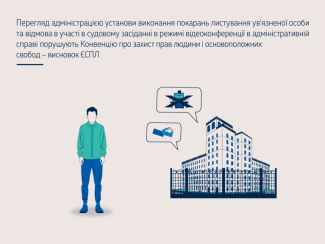Contact center of the Ukrainian Judiciary 044 207-35-46

This is the conclusion reached by the European Court of Human Rights in the case of IVAN KARPENKO v. UKRAINE (No. 2) (No. 41036/16).
The applicant in this case is serving a life sentence. His application to the ECtHR concerned complaints under Article 8 of the Convention for the Protection of Human Rights and Fundamental Freedoms that the prison administration had illegally reviewed his correspondence. He also complained under Article 6(1) of the Convention about the unfairness of the proceedings in which he tried to challenge the actions of the administration of the penitentiary institution, as the national courts did not allow him to participate in court hearings via videoconference in view of the provisions of the procedural law in force at the time.
The ECtHR has confirmed that national courts must conduct a thorough analysis of the nature of the dispute in order to determine whether it requires the appearance of a party in custody. If the claim is based primarily on the personal experience of the party in custody, the opportunity to hear them in person is an important part of presenting their case. In fact, it is the only way to ensure the adversarial nature of the trial. In such circumstances, the obvious solution would be to hold a court hearing at the applicant's place of detention or via videoconference. However, in this case, the courts refused to allow the applicant to participate in the hearing via videoconference due to the lack of relevant legislative provisions. The ECtHR noted that a gap in national legislation cannot be a ground for non-compliance with the standards set out in the Convention. Therefore, there was a violation of paragraph 1 of Article 6 of the Convention.
By the way, currently the provisions of Article 195 of the Code of Administrative Procedure of Ukraine provide for the possibility to participate in a court hearing via videoconference both outside the court premises using one's own technical means and from the premises of another court, provided that the court has the appropriate technical capabilities.
With regard to Article 8 of the Convention, the ECtHR noted that it had repeatedly found violations of this provision in cases involving the familiarisation of penitentiary staff with the content of correspondence between prisoners and national courts. The ECtHR came to the same conclusion in this case.
A more detailed description of this decision can be found in the following reviews of the ECtHR case law, and the previous review is available here: https://cutt.ly/0rcvERWt.
The official text of the judgment IVAN KARPENKO v. UKRAINE (no. 2) is available on the website of the European Court of Human Rights: https://hudoc.echr.coe.int/eng?i=001-242784.